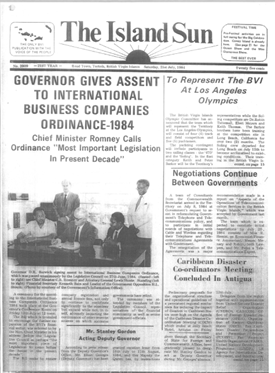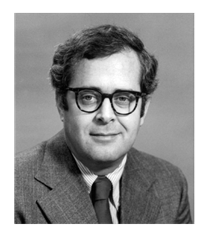Seminal global offshore industry legislation to reach its 30th anniversary in August
The IBC Act was developed by three Harney Westwood & Riegels (Harneys) partners, Michael Riegels, Neville Westwood, and Richard Peters, along with then-BVI Attorney General Lewis Hunte and Paul Butler, a Wall Street lawyer from Shearman & Sterling.
The IBC Act was born after the United States cancelled its double taxation treaty with the BVI and other Caribbean nations in 1982. Mr Butler suggested to his Harneys colleagues that the best way to respond was to offer a tax-neutral company that could provide a user-friendly, flexible corporate vehicle for multiple commercial purposes. The so-called “Gang of Five” mentioned above was tasked with developing legislation to create this new corporate product. The bulk of the work was done by Mr Peters, a tax barrister from London who was new to Harneys at the time, but later became the firm’s global managing partner for 21 years.
The draft was written, and reviewed with Mr Hunte in the Attorney General’s Chambers, to work it into suitable BVI legislative format. It was based on Delaware corporation law but incorporated additions from innovative company legislation elsewhere. The IBC Act was radical at the time – it streamlined the incorporation procedure, removed the requirement of corporate capacity, abolished the need for corporate benefit, recognised that companies could exist without members, and permitted companies to provide financial assistance for the acquisition of their own shares. It provided for true statutory mergers and created new statutory tools for restructuring and reorganisation. (Most of these innovations would not appear in English company law until the Companies Act 1986, and some did not appear until the Companies Act 2006.)

“While Harneys is now an international firm with seven global offices, our heritage is in the BVI,” says Peter Tarn, Chairman of Harneys’ Executive Committee. “Our partners have played a key role in developing BVI commercial legislation for more than fifty years and this continues today. The IBC Act was ahead of its time in 1984, and its influence remains in the BVI and beyond.”
The IBC Act generated a booming finance industry and unimagined prosperity for the BVI. Incorporation numbers exploded in the decade following its enactment, with nearly 50 percent growth year-on-year. Infrastructure was upgraded and construction flourished as new business arrived. In 1999, KPMG estimated that the BVI had amassed a 41 percent global market share for offshore vehicles. By 2004 the BVI would have the 12th highest GDP per head of population in the world.
The IBC Act was eventually repealed in 2006 and replaced by the new legislation. In the meantime, however, its core components had been copied (often verbatim) by other jurisdictions seeking to build finance industries. In 1990, the Bahamas and Belize created IBC legislation. The Bahamas today boasts one of the richest economies in the Americas in terms of GDP per capita, with financial services accounting for approximately 15 percent of its GDP. The IBC Act was copied by Anguilla in 1994. Today, Anguilla’s economy relies on offshore incorporation and management, offshore banking, and captive insurance alongside tourism. The BVI model was also followed in St Kitts, St Lucia, and St Vincent and the Grenadines.
The Story of the IBC Act:

The Authors of the IBC Act:

Neville Westwood
Neville Westwood joined the firm in the BVI in 1967 and was a founding partner along with Harold Harney and Michael Riegels.
He was one of the “Gang of Five” responsible for creating the BVI’s landmark IBC Act of 1984, which generated unforeseen business opportunities and prosperity for the BVI.

Michael Riegels, QC
Michael Riegels, QC, was a founding partner of Harney Westwood & Riegels. His tenure with the firm began in 1973 and ended in 1997. He was part of the “Gang of Five” who created the BVI’s IBC Act. He is now retired.
He was the inaugural chairman of the BVI Financial Services Commission and served as president of the BVI Bar Association from 1996 to 1998.
In 1999, he was appointed by the BVI government as chairman of a high-profile public inquiry into a prison escape.

Richard Peters
Richard Peters was Harneys’ Managing Partner for 21 years. He left in 2012 after a 33-year career with the firm.
Prior to joining Harneys in the BVI, Richard was a tax barrister in London. In the early part of his Harneys tenure, he was a primary developer of the BVI’s landmark IBC Act. He was also the driving force behind many of the subsequent amendments to the law.
Under his leadership, the firm partnered with the BVI government in the creation of the Commercial Court, produced the first-ever textbook on BVI commercial law, and increased its range of practice areas. Richard chaired the BVI’s Financial Services Strategic Development Plan Committee and sat on the Company Law Reform Committee and Harmful Tax Competition Task Force of the Financial Services Legislation Advisory Committee.
As managing partner, Richard led Harneys through a programme of strategic expansion that launched offices in Hong Kong, the Cayman Islands, Cyprus, and Montevideo.

Lewis Hunte, QC
Lewis S Hunte, QC, held the post of Attorney General of the BVI from 1982 to 1985 and has acted from time to time as a judge of the High Court of the Eastern Caribbean. He also held a number of posts in the legal services of Barbados and Jamaica and completed a one-year stint at the Federal Department of Justice in Ottawa, Canada.
As well as authoring the BVI’s IBC Act along with Paul Butler, Richard Peters, Michael Riegels and Neville Westwood, he drafted the 1982 Intellectual Property Legislation of Barbados and the Model Insurance Legislation of the Caribbean Law Institute. His publications include The Elucidation of the Intellectual Property Laws of Barbados and A Status Report of the Intellectual Property Laws of the Commonwealth Caribbean.
Mr Hunte was part of a delegation which called on Premier of the BVI Dr the Hon Orlando Smith in January 2014, in commemoration of the IBC Act anniversary.
Mr Hunte is the founding partner of Hunte & Co and continues to practice law in the British Virgin Islands.”

Paul Butler
Paul Butler spent more than 30 years as a senior partner with renowned New York law firm Sherman & Sterling LLP, one of the largest legal firms in the world. Now retired, he also served as the firm’s Managing Partner.
His association with Harney, Westwood & Riegels began in the late 1970s when he contacted the BVI firm to discuss opportunities regarding tax treaties with the United States. He subsequently became one of the “Gang of Five” responsible for creating the BVI’s IBC Act.
Mr Butler was part of a delegation which called on Premier of the BVI Dr the Hon Orlando Smith in January 2014, in commemoration of the IBC Act anniversary.
